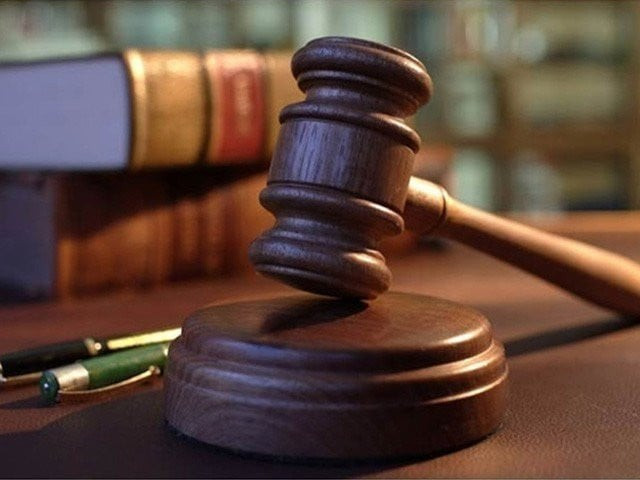SHCBA challenges Registrar Office’s objection to its plea
Lawyers body wants SC restructured the process of appointment of judges to the superior judiciary

The Sindh High Court Bar Association (SHCBA) has challenged the Supreme Court Registrar Office’s objections to its constitutional petition under Article 184 (3) of the Constitution against the appointment of junior high court judges to the apex court.
Former SHCBA president Salahuddin Ahmed and SHCBA Secretary Omar Soomro had filed the petition in the Supreme Court with the prayer that Rule 3 of the Judicial Commission of Pakistan Rules, 2010 regarding discretionary powers of the chief justice of Pakistan (CJP) may be set aside.
The petition also requested the apex court that the process of appointment of judges to the superior judiciary be restructured and the judges from high courts be elevated to the Supreme Court by adhering to the principle of seniority for the smooth functioning of the judiciary in the interest of justice.
However, the Supreme Court Registrar Office returned the petition by raising seven objections. One of the objection was that the petitioners had not pointed out what questions of public importance were involved with reference to invoking the apex court’s jurisdiction under Article 184(3) of the Constitution.
Now the petitioners have filed an appeal against these objections. It said that Registrar could not decide the question of the maintainability or entertainability of a petition on the touchstone of Article 184 (3) as it was a matter within the exclusive preserve of a bench of no less than two Judges.
“Even otherwise, the learned Registrar was only entitled under Order XVII Rule 5 of the Supreme Court Rules 1980 to refuse to receive a petition if it was frivolous or not in accordance with the Rules and he could not have entered into a determination regarding the scope and purview of Article 184 (3) of the Constitution and the existence of an alternate remedy, says the appeal,” the petition said.
“It is also stated that without prejudice to the foregoing, in response to ground raised by the registrar it is submitted that the order fails to appreciate that the retention of public confidence in the judiciary and, in particular, the process of judicial appointments is essential for the meaningful realization of the fundamental right of access to justice and for fulfillment of the fundamental rights guaranteed under Article 9 and 10-A of the Constitution read with Articles 2 A, 4, 37(d) and 175 thereof,” it added.
Read SC refuses to entertain SHCBA petition
“Moreover, an effective and independent judiciary comprising of judges selected in the best possible objective manner is essential for the effective realization of each and every one of the Fundamental Rights guaranteed under the Constitution,” the petition continued.
“It is in this context and against the backdrop illustrated in the facts of the Petition, that grounds raised by the petitioners are of immense public importance in order to ensure public confidence in the judiciary as well as access to justice.”
Meanwhile, the Lahore High Court Bar Association (LHCBA) has also filed a similar petition, seeking direction to the chief justice to invite all stakeholders, including judges, senior lawyers and bar representatives, members of the parliamentary committee, federal and provincial governments, civil society and litigants to make suggestions with a view to structuring the process of judicial appointments to the superior courts and make the same more objective and transparent and to conduct such seminars, workshops or consultations as may be necessary in this regard to hear all relevant viewpoints.
The LHCBA through renowned lawyer Hamid Khan prayed to the apex court that the JCP be directed to frame comprehensive and detailed rules and guidelines to structure both the process of appointments and the criteria and parameters for appointments after considering various aspects of the matter.
“Till then, the petition requested, the seniority principle in the elevation of High Court judges to the apex Court be strictly adhered to. LHCBA stated that the Rule 3 of the JCP Rules 2010 restricted the power to initiate nominations to the Chief Justice of Pakistan for a vacancy in the Supreme Court.
“For a vacancy in the High Courts or Federal Shariat Court, the power to initiate nominations is reserved to their respective Chief Justices. As such, even if a majority of the Judicial Commission is agreed that a particular person is the most suitable for appointment to a particular vacancy; it can do nothing unless the concerned Chief Justice decides to nominate him. This is contrary to the scheme and intention of Article 175-A,” the LHCBA petition said.
Read more SHCBA to challenge appointment of SC judges against seniority principle
“Rule 3 does not even specify whether the concerned Chief Justice will propose nomination of one, two, three or more candidates for each vacancy. If he only proposes one name for a vacancy, the Commission could only accept or reject the same but would not be able to propose an alternative (even finer) candidate,” it stated.
“On the other hand, it may be that some excellent candidates are deprived of due consideration by the Commission merely because the concerned Chief Justice has overlooked him or her for some reason,” the petition continued.
“This restriction defies the very purpose and intent behind the promulgation of Article 175-A which was to remove the primacy of one individual (namely the Chief Justice) in the appointment process with the collective wisdom of all stakeholders.”






1724319076-0/Untitled-design-(5)1724319076-0-208x130.webp)












COMMENTS
Comments are moderated and generally will be posted if they are on-topic and not abusive.
For more information, please see our Comments FAQ